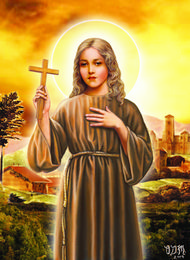Lives of the Saints
Our Models and Protectors
Spiritual Bouquet:
September 4

O.D.M. pinxit
Saint Rose of Viterbo
Virgin
(1235-1252)
Saint Rose was born in the spring of 1235 at Viterbo, capital of the patrimony of Saint Peter. In those days the emperor Frederick II was oppressing the Church, and many were faithless to the Holy See. But this infant at once seemed filled with grace; she never cried; with tottering steps she sought Jesus in His tabernacle; she knelt before sacred images and listened to sermons and pious conversation, retaining all she heard, and this when she was scarcely three years old. One coarse habit covered her flesh; fasts and disciplines were her delight.
At the age of seven she wished to enter a monastery of nuns; but God had other designs for her, and she resolved to create a solitude in her father's house, where she would forever spend all her days. Her mortifications there seem incredible to our time of laxity; she gave herself the discipline three times a day until she fainted from fatigue and loss of blood, and she scarcely ate at all. To those who urged her to mitigate her austerities, she explained so perfectly that happiness consists in suffering for God, that no one could doubt this was so for her.
Nonetheless she fell ill and nearly died of consumption. She was close to the final agony when suddenly she beheld the Mother of God, and said to those attending her: All of you here, why do you not greet the Queen of the world? Do you not see Mary, the August Mother of my God, coming forward? Let us go to meet Her, and prostrate ourselves before Her majesty! Everyone turned toward the door and knelt down, and the Mother of God spoke to Rose, telling her she must enter the Third Order of Saint Francis, then go out to reprove, convince, exhort and bring back the erring to the paths of salvation. If your endeavors bring upon you sarcasm and mockery, persecution and labor, you must bear them patiently... Those who assist you will be enriched with all the graces of the Lord.
To defend the Church's rights was already Rose's burning wish. When hardly ten years old, she arose after her reception into the Franciscan habit, went down to the public square at Viterbo, called upon the inhabitants to be faithful to the Sovereign Pontiff, and vehemently denounced all his opponents. She returned to her house only to redouble her flagellations and macerations; she saw her Saviour on the Cross and nothing could arrest her ardor thereafter. So great was the power of her word and of the miracles which accompanied it, that at the end of several months the Imperial party, after threatening her in vain to stop her preaching, in fear and anger drove her from the city.
Saint Rose and her parents moved to Soriano, a fortified city, where she continued to do as she had been told by the Mother of God. Then Rose went on by herself to Vitorchiano, where she had understood there was need for her, and continued to win souls by her aspect as much as by her words. She went barefoot and wore a poor tunic at all times, until after some eighteen months, when the emperor had died, she and her parents returned to Viterbo. Innocent IV was brought back in triumph to Rome and the cause of God was won.
A number of young girls came to her for instruction at Viterbo, and she taught them the principles of modest prudence and faithful love of God. Rose fell ill again and recognized that her end was approaching; she prepared, rejoicing, in solitude for her glorious destiny, and died in her eighteenth year. Not long afterward, she appeared in glory to Alexander IV, and bade him to translate her intact body. He found it fragrant and beautiful, as if still in life. For more than 700 years it has remained supple and unchanged, save for its color, darkened after a fire in the chapel where it reposed.
Reflection: Rose lived but eighteen years, saved the Church's cause, and died a Saint. We have lived, perhaps, much longer, but with what result? Every minute something can be done for God. Time is the money for eternity; shall we waste it and have nothing to show for it?
Les Petits Bollandistes: Vies des Saints, by Msgr. Paul Guérin (Bloud et Barral: Paris, 1882), Vol. 10; Little Pictorial Lives of the Saints, a compilation based on Butler's Lives of the Saints and other sources by John Gilmary Shea (Benziger Brothers: New York, 1894).